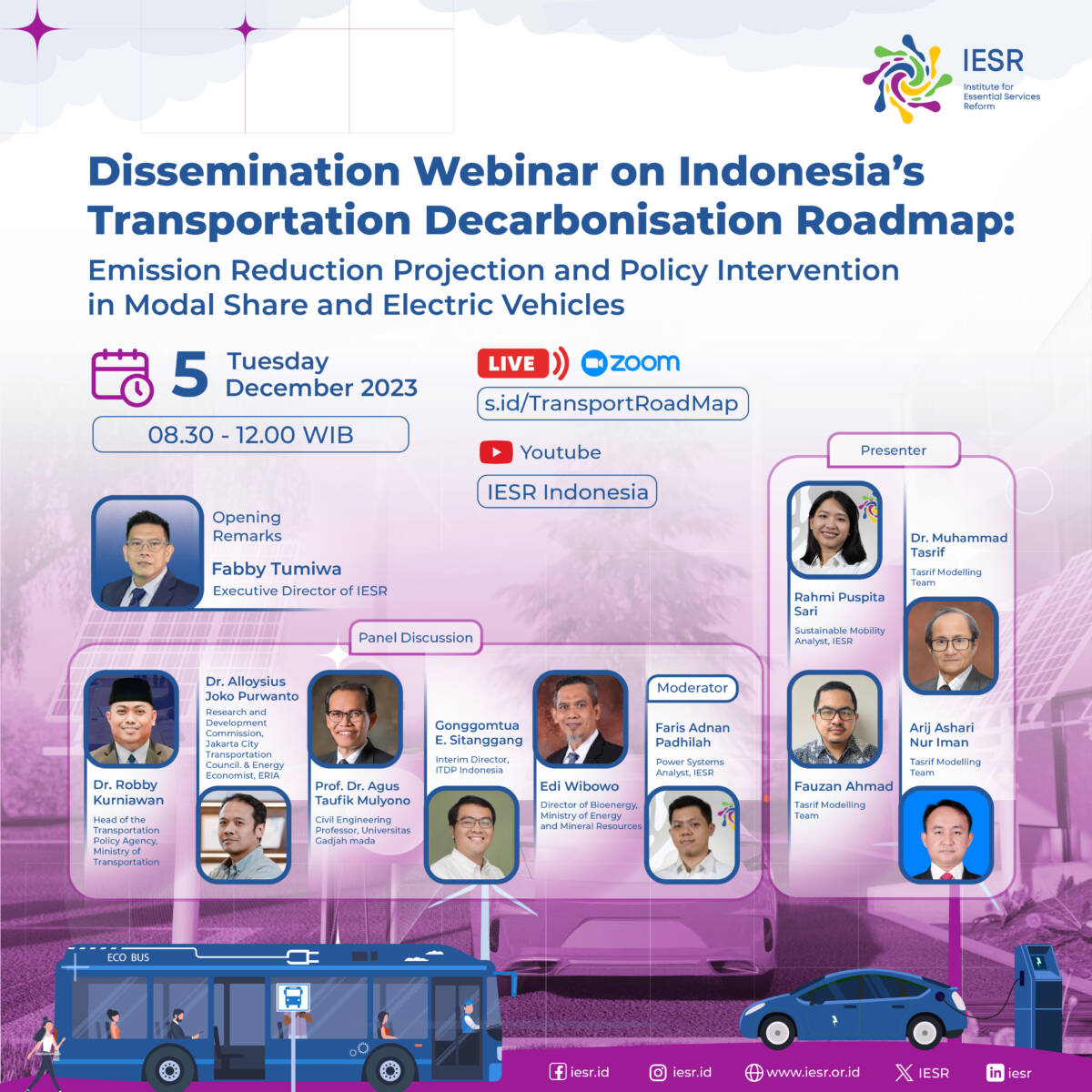
Dissemination Webinar on Indonesia’s Transportation Decarbonisation Roadmap
Replay Streaming
Background
Indonesia has endorsed a commitment to keep global temperature below 1.5 OC in line with the Paris Agreement through regulation No. 6 of 2016. Although the Indonesian government has put its NDC targets (41% emission reduction in 2030 compared to BAU, and net-zero emissions in 2060), it is still not enough to fulfill the Paris Agreement goals. The energy sector is projected to dominate Indonesia’s future emissions. In addition, from a technical and economic perspective, the energy sector in Indonesia can achieve zero emissions by 2050.
The transportation sector accounts for 23% of Indonesia’s total energy consumption in 2021, replacing Industry as the largest energy-consuming sector since 2012. Energy consumption by the transportation sector is dominated by petroleum fuels such as gasoline, diesel and aviation fuel. In 2017, this sector contributed around 26% of the energy sector’s greenhouse gas (GHG) emissions, or around 147 million tons CO2e. This figure does not include GHG emissions lost in the upstream oil processing industry, which contributes about 7% of the energy sector’s associated GHG emissions. In 2021, the land transportation mode contributes about 90% of the total transportation sector emissions, followed by the air and maritime transportation sectors.
The government has undertaken several initiatives and policies in the transportation sector to reduce emissions, such as the use of biofuels, public vehicles (mode shift), and most recently the move to electric vehicles. One of the drivers is the high increase in fuel imports that has occurred since 2004. However, these policies have not been anchored by a common planning document (or so-called roadmap), and as such, there is potential to optimize efforts and costs in implementing existing initiatives and promoting new ones to support decarbonization of the transport sector. Therefore, in this program focus, IESR is currently modeling a roadmap that can provide guidance on what aspects or strategies to prioritize to effectively reduce emissions in the transportation sector, using system dynamics methodology.
Objective
To further disseminate the findings of the system dynamics modeling of the roadmap for decarbonization opportunities in the transportation sector of the Jabodetabek national and regional model structures
More specifically, the discussion in this meeting is expected to:
- Disseminate and share information on Indonesia’s transport decarbonization roadmap to relevant key stakeholders, including policy makers, transport actors, associations, and research institutions.
- Receive inputs and validate the transport decarbonization roadmap from relevant key stakeholders.
- Discuss key and actionable policies required to implement the transport sector decarbonization roadmap at national and regional scales.
- Identify future challenges, opportunities, and support from relevant key stakeholders
Materi Presentasi
Dissemination Webinar on Indonesia’s Transportation Decarbonisation Roadmap: Emission Reduction Projection and Policy Intervention in Modal Share and Electric Vehicles – Rahmi Puspita S, Fauzan Ahmad & Arij Ashari N
Slide-deck-Presenter-Diseminasi-Dekarbonisasi-Transport-5-Oktober-2023-Pemodelan Dinamika Sistem (System Dynamics) Transportasi: Dekarbonisasi – Dr Muhammad Tasrif
Slide-deck-Presenter-Pengantar-Model-Diseminasi-Dekarbonisasi-Transport-5-Oktober-2023Emission Reduction Projection and Policy Intervention in Modal Share and Electric Vehicles – Prof. Dr. Agus Taufik Mulyono
Slide-deck-Penanggap-Prof.-Agus-TM-Diseminasi-Dekarbonisasi-Transport-5-Oktober-2023-Speaker
-
Faris Adnan Padhilah - Research Coordinator in Energy Demand Management Group - IESR

